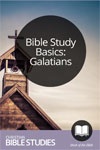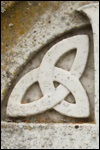Mark reminds us in his first chapter that Jesus was a man of prayer: "In the morning, while it was still very dark, he got up and went out to a deserted place, and there he prayed" (Mark 1:35). This characteristic of our Lord is noted in all the Gospels, especially Luke. Luke records not only this incident, but he also tells his readers that Jesus prayed before his baptism (Luke 3:21) and spent the night in prayer before selecting the Twelve (6:12-16). When Luke notes that Jesus "would withdraw to deserted places and pray" (Luke 5:16), he's indicating that this was a regular practice of our Lord.
It should not surprise us then that Jesus, a man of prayer even more so than the saints, will act oddly sometimes.
What Jesus does in this early scene in Mark (1:36-39) is odd indeed. Suffering people are coming to him, people who are ill, lonely, lost, crippled, anxious; some are no doubt dying. These sufferers—locals, thus many of whom he knows—are literally begging for his healing touch and life-giving words. So Simon and company search out Jesus to alert him.
Jesus just tells them to take a hike. Or more accurately, he takes a hike to go to neighboring towns, "so that" he tells them, "I may proclaim the message there also" (Mark 1:38).
In a culture in which family and community had the right to one's allegiance, this must have been something of a shock. This backwater area of the Roman Empire finally has a wonderworker in their midst, and he's not even going to help the hometown folks? What an ingrate.
It is a strange thing to do, especially after spending an entire evening in prayer. One would assume that prayer would have made Jesus even more compassionate. Instead, after prayer, he appears more insensitive than ever.
Since we know the end of the gospel story, we can safely assume that Jesus is anything but an ingrate. We can also assume he deeply loves his family, friends, and the people who are clamoring for his help—many of whom he has known growing up in the region. He surely looks upon these people with more warmth than on a city of strangers many miles away, when he later says, "Jerusalem, Jerusalem. … How often have I desired to gather your children together as a hen gathers her brood under her wings" (Matt. 23:37).
We can surmise, then, that it was not an easy thing for Jesus to say to his disciples, "Let us go on to the neighboring towns" (Mark 1:38). I dare say it may have torn him apart inside.
Greater love has no man than that he should give his life for his friends, Jesus once said (see John 15:13). True enough. But it appears also to be true that sometimes no greater love has a God-lover than that he should abandon his friends, not to mention his family.
The history of the church is filled with similar examples. Antony of Egypt was responsible for the care of his sister after the death of their parents. Yet after he sensed a call to a life of prayer in the desert, he had to leave her in the care of others. Francis of Assisi essentially repudiated his natural father to, as he put it, give his life to his Father in heaven. Family and friends have a way of making demands on us—sometimes demands based on very real needs—but the urging of God gives us the courage to make the painful choice of ignoring those needs for another call.
But don't we also know of too many instances when this divine call was used to evade genuine responsibilities? David Livingstone left his wife and family in England for years at a time so that he could sojourn in Africa. John Wesley and George Whitfield abandoned their wives for months at a time to preach in England and America. And how many children of pastors, filled with resentment, refuse to darken the door of a church today because to them "the call of God" was nothing but an excuse for their parents to ignore them and indulge in their religious enthusiasms?
So we find that this little story in Mark has a double edge. How simple it would be to end this chapter with a bold call to leave family and friends to follow the upward call of God. Or how easy it would be to simply scold religious enthusiasts for ignoring their familial duty.
But Jesus won't let us off the hook so easily. The Jesus who in this passage leaves family and friends to preach and heal relative strangers is the same one who stayed at home until he was thirty, long past the age when young men of that day did so.
It seems that there is a time to do one's familial duty, to stay with the mother who insists on it, perhaps even to her death. And there is a time to ignore the pleas of family and friends, even when those pleas arise out of genuine need.
Ah, but how do we know which time is which? Perhaps there are guidelines or principles that tell us what to do, when to nurture family and when to minister to the stranger. Perhaps there is an aphorism that can give us wisdom or a wise man who can teach us the inerrant way. No, the solid guidance we need is found elsewhere, in a place more mysterious.
It is the place where Jesus went time and again, the place that let him know when it was time to stay in Nazareth and when it was time to move on to other regions. It is the place where Morrison and Antony and Francis and others learned when to love their families and when to love the lost. It is the place where we encounter the living God.
Prayer is a mysterious, unfathomable, intense conversation with the Father, who will not give us formulas and principles but will give us himself. The guidance he gives, of course, does not come in an instant, and it does not come as clearly as an email. But come it will for those who, like Jesus and the saints, seek out this place regularly.
Mark Galli is the managing editor of Christianity Today.
This article is excerpted from chapter four of Jesus, Mean and Wild. Used by permission from Baker Books, a division of Baker Publishing Group, copyright 2006. All rights to this material are reserved. Materials are not to be distributed to other web locations for retrieval, published n other media, or mirrored at other sites without written permission from Baker Publishing Group, www.BakerPublishingGroup.com.










